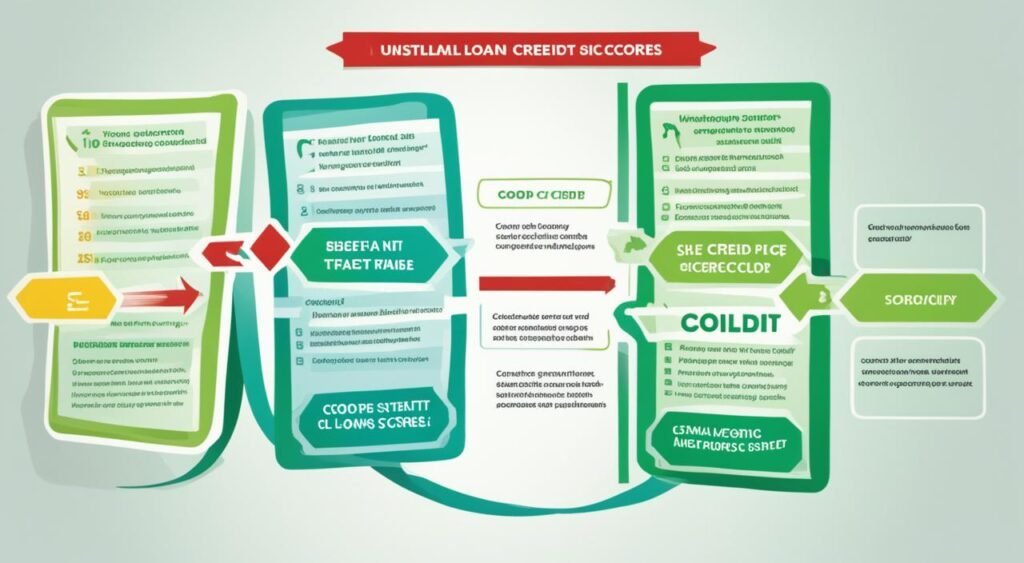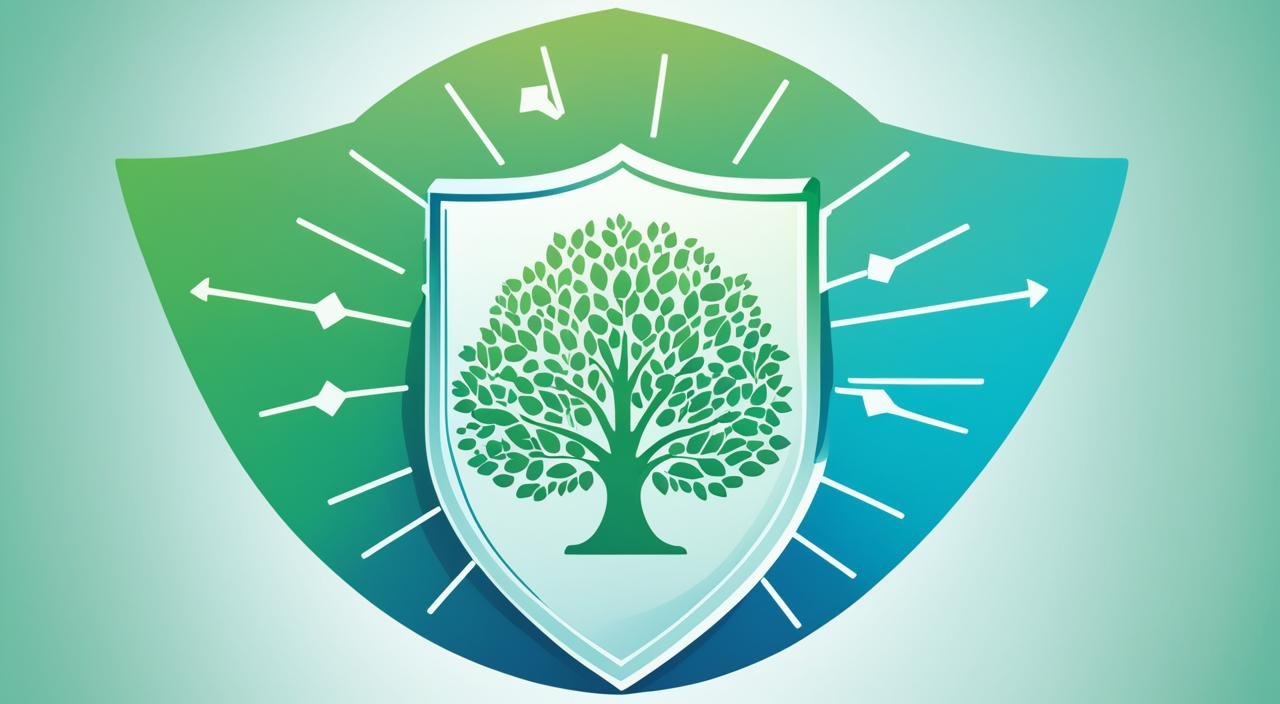An installment loan lets you borrow money in a common way. It’s a type of credit account that’s closed-ended. You receive a lump sum upfront and pay it back over time in equal monthly installments. This way, you can use installment loans to finance big buys, consolidate debt, or fund your education. These loans can take many shapes, like personal loans, auto loans, mortgages, and student loans. They can be secured (requiring something like a house or car as a promise you’ll pay) or unsecured, depending on how good your credit is.
Key Takeaways
- An installment loan is a type of closed-ended credit account where borrowers receive a lump sum upfront and repay it over time in equal monthly installments.
- Installment loans can be used for various purposes, including major purchases, debt consolidation, and education financing.
- Installment loans can be secured, requiring collateral, or unsecured, based on the borrower’s creditworthiness.
- Understanding the different types of installment loans and how they work is crucial for making informed borrowing decisions.
- Careful consideration of the advantages and disadvantages of installment loans is necessary to determine if it is the right financing option.
What Is An Installment Loan?
An installment loan gives a big amount of money at once. You pay it back in regular amounts over time. This method is popular for needs like buying a car, getting a house, or paying for school.
Definition and Key Characteristics
Installment loans are known by some key points. You get the whole loan right at the start. Then, you pay it back monthly with the same amount each time.
If you got the loan, you can’t add more to it. This is different from credit cards, where you can keep using it. With installment loans, you get a set amount from the beginning.
Types of Installment Loans
Common types include:
- Personal loans – Money for personal needs, not backed by an asset
- Auto loans – Money for buying a car
- Mortgages – Money for buying a house
- Student loans – Money for college or university costs
- Payday loans – Quick, expensive loans to be repaid soon
- Buy-now, pay-later – Let’s you pay for something in parts after buying
All these loans give you money at first. You then pay them back over time, without adding more money to the loan.
How Do Installment Loans Work?

Installment loans give you a big sum of money when you start. You pay it back in small, regular parts. This is unlike payday loans, which you usually pay back all at once. It helps you plan your spending better and avoid big payments you can’t handle.
Here’s how installment loans work:
- Lump Sum Disbursement: You get all the money at the start when you take the loan. So, you can use it right away for what you need.
- Fixed Repayment Term: You know from the beginning how long you have to pay it back. It’s usually a certain number of months. This makes it easier to plan your payments.
- Monthly Payments: Every month, you pay back some of the loan plus the interest on it. The size of each payment does not change over time.
Your monthly payment size depends on how much you owe, the interest rate, and how long you have to pay. The longer you have to pay, the less you pay each time. But, you will pay more in total interest if you take longer to pay off the loan.
| Loan Amount | Interest Rate | Repayment Term | Monthly Payment | Total Interest Paid |
|---|---|---|---|---|
| $10,000 | 10% | 24 months | $453.78 | $889.72 |
| $10,000 | 10% | 36 months | $312.44 | $1,247.76 |
When you make your final payment, you’re all done. Your loan is closed. This way of paying back money helps you manage your finances better and not get stuck with hidden fees.
“Installment loans provide a predictable, manageable way to borrow money and pay it back over time.”
Secured vs. Unsecured Installment Loans

Installment loans fall into two camps: secured and unsecured. Knowing the differences is key for making the best choice. It helps you pick what fits your financial situation and goals.
Secured Loans and Collateral
Secured loans need something valuable, like a home or car, as a backup. This makes the deal safer for the lender. They might then offer you better terms, like lower interest.
If you go for a secured loan, the thing you put up as security (like a car) makes sure you pay back. If you don’t, the lender can take your thing to cover their losses. So, they feel more secure about lending to you.
Unsecured Loans and Creditworthiness
Unsecured loans, though, don’t ask for a big thing up front. It’s all about how trustworthy you seem to the lender. Things like your credit history and how much you earn are very important here.
The risk is higher for lenders with these loans, so they sometimes charge more interest. If you have a great credit score, you might still get a good deal. But if not, you might end up paying more or getting a less comfy repayment plan.
| Secured Installment Loans | Unsecured Installment Loans |
|---|---|
| Require collateral (e.g., a house or car) | Do not require collateral |
| Lower interest rates due to reduced risk for the lender | Higher interest rates to compensate for the increased risk |
| Lender has the right to seize the collateral in case of default | Approval based solely on the borrower’s creditworthiness |
Choosing secured or unsecured will depend on what you need and can do. For one, you need to have something valuable to offer. For the other, good credit and stable income matter more. Knowing these differences helps you pick what suits you best.
Applying for an Installment Loan
Applying for an installment loan might seem hard, but it’s not with the right info. The steps like filling out the form and being checked by the lender are crucial. These steps decide if you’ll get the loan or not.
Loan Application Process
When applying, you fill out a form with your money details included. This means telling the lender about your income, assets, and creditworthiness. They check this info to see if you’re fit for the loan.
Applying might be slightly different among lenders. But, you’ll likely need to send:
- Your personal ID (like a driver’s license or Social Security number)
- Proof of your pay or income (such as pay stubs or bank statements)
- Why you need the loan
- Any debts you already have or other money you owe
Lender Evaluation and Approval
After sending in your form, the lender will review all your info. They mainly focus on your financial health, which they figure out using things like your credit score, debt-to-income ratio, and collateral (if the loan is secured).
If you offer something valuable as a guarantee, they will check it very thoroughly. This is to make sure it’s enough if you can’t pay back the loan.
If the lender thinks you’re okay, they start the loan approval. This might mean looking deeper at your house or more financial checks. If they like what they find, and you’re good with the loan terms, they give you the money.
To improve your chances, know how to apply, and what lenders look for. Gather your documents and make sure to be honest about your money situation. This makes the loan approval smoother.
Advantages of Installment Loans
Installment loans are great for those wanting to buy big or pay off debts. They provide a large chunk of cash at the beginning. This helps you pay for things like home improvements, a new car, or medical costs.
They also make payment planning easy. Each month, you pay the same amount because the interest rates and schedule are fixed. This consistency helps in managing your money and budget well.
If rates go down or your credit score gets better, you may refinance. This move could lower your monthly costs or the time it takes to pay back. In the end, you could save some cash.
| Advantage | Description |
|---|---|
| Access to Lump Sum Financing | Installment loans give you a big amount of money for significant buys or debt pay-off. |
| Predictable Monthly Payments | Payments are the same each month with set interest and schedule. It’s great for budgeting. |
| Opportunity to Refinance | If rates drop or credit gets better, you can refinance. This may save you money. |
Installment loans are a solid choice for funding big buys or debt merging. They offer a huge amount up front, easy payment plans, and a chance to refinance. These factors give the flexibility and reliability needed to hit financial targets.
Disadvantages of Installment Loans
Installment loans might seem like a great choice, but there are some downsides to think about. They aren’t like a credit card where you can keep borrowing on the same account. So, you might find you’re stuck with the amount you originally borrowed.
Long Repayment Terms
One big issue with installment loans is how long you might have to pay them back. You could be looking at several years of payments. This long commitment might get hard to manage if your money situation changes.
The more time you take to repay, the more you’ll pay in interest. This is something to keep in mind with installment loans.
Prepayment Penalties
Remember, there can be a cost for paying off your loan early. These prepayment penalties could eat into any money you might save by paying early. It gives borrowers fewer reasons to pay back their loans sooner, even when they’re able to.
Before taking out an installment loan, consider these points. Make sure you’re okay with the fixed amount, the long commitment to repay, and the penalties for early repayment.
Installment Loan and Credit Scores

Understanding how installment loans affect credit scores is key. It has both good and bad effects. Getting an installment loan may lower your credit score at first due to a hard credit inquiry. But, steadily paying it off on time can boost your credit. This is because it improves your credit mix, an important part of your credit score.
Whether an installment loan is good or bad for credit scores varies. If you pay your installment loan on time, it can help your credit. Being responsible shows future lenders that you can handle different kinds of debt.
| Impact on Credit Scores | Positive | Negative |
|---|---|---|
| Hard Credit Inquiry | – | Temporary decrease in score |
| On-Time Payments | Helps build credit and improve credit mix | – |
Your unique financial situation and how you repay your loan affect your credit score. Making payments on time can have a good effect. But, missing payments or not paying at all can hurt your credit.
“Responsible borrowers who make their installment loan payments on time can see a positive impact on their credit score over time.”
Alternatives to Installment Loans

Installment loans are not the only way to finance expenses or big buys. There are other credit options. These options can be more flexible and cost less. Credit cards, personal lines of credit, and home equity lines of credit are common choices.
Credit cards let you buy things and pay them off over time. They’re more flexible than loans. You can pay the full amount each month or just the minimum. But, cards usually have higher interest rates than loans.
Personal lines of credit work like credit cards. They’re usually from banks or money companies. You can take money out when you need it, up to a set limit. You only pay interest on what you borrow. They might have lower interest rates than cards. But, you might need to use your house or another valuable thing as a guarantee.
A home equity line of credit (HELOC) is another option. This lets homeowners borrow against the value of their house. Rates are lower because your home secures the loan. Yet, if you can’t repay, you might lose your home.
| Credit Option | Interest Rates | Flexibility | Collateral Required |
|---|---|---|---|
| Credit Cards | Higher | High | No |
| Personal Lines of Credit | Medium | High | Possibly |
| Home Equity Lines of Credit | Lower | High | Yes (Home) |
It’s smart to really look at your financial situation and credit before choosing. Each option has its own terms and costs. Make sure it fits your needs and budget.
“Choosing the right credit solution can make a significant difference in the long-term cost and flexibility of financing your financial needs.”
Also Read: Expert Loan Advisor Tips For Smart Borrowing
Conclusion
In the United States, installment loans are a useful financial choice for many people. They’re a type of loan that comes with different options and benefits. This makes it easier for folks to decide if getting one is a good idea for them.
When thinking about an installment loan, it’s crucial to look at the terms and how you’ll pay it back. This can help you understand if it fits your budget and financial plans. By doing so, you can make a smart choice for your future.
Choosing an installment loan means looking at your own finances first. Make sure you know what you need and can handle. This way, you pick something that really helps you reach your goals.
FAQs
What is an installment loan?
An installment loan lets you borrow money and pay it back over time. You get all the money upfront. Then, you pay it off in equal amounts every month.
What are the key characteristics of installment loans?
Installment loans have a few important features. These include a fixed term, regular monthly payments, and you can’t borrow more while you have one. They cover various needs, like personal expenses, buying a car, getting a home, and more.
How do installment loans work?
With an installment loan, you get all the money at the start. Then, you pay it back in fixed amounts over a set period. How much you pay each month depends on the loan size, the rate, and how long you have to pay it off.
What is the difference between secured and unsecured installment loans?
Secured loans need something valuable from you, like your house or car, as a promise. This makes the loan less risky for the lender. So, they usually have lower interest rates. Unsecured loans don’t ask for anything but trust your ability to pay. Yet, they might have higher rates.
How do you apply for an installment loan?
To get an installment loan, fill in an application. You’ll need to share details about what you earn, own, and how trustworthy you are financially. The lender will use this info to decide if you qualify and to set the terms.
What are the advantages of installment loans?
Installment loans are good because they let you have a big amount of money when you need it. You pay the same amount every month, making it easy to budget. If interest rates lower, or your credit gets better, you can often make the loan better, too.
What are the potential drawbacks of installment loans?
But, there are some things to watch out for. You can’t add more to your loan once you have it. Also, you might end up paying for many years, which is a big commitment. And if you pay it off early, you could face extra fees.
How do installment loans affect credit scores?
When you apply for a loan, the check might lower your credit score a bit. But, if you pay on time, it can help your credit grow stronger. It also helps to have different types of credit, which affects your score.
What are some alternatives to installment loans?
If you prefer more flexible borrowing, check out options like credit cards, personal lines of credit, or home equity lines. They offer different ways to handle your finances.
